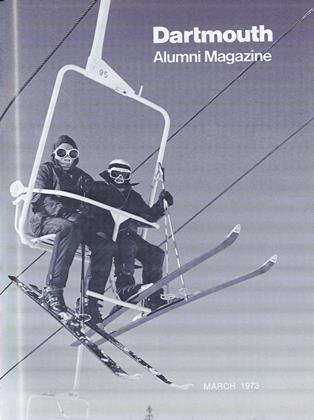With a trunk covered with cow-hide and cowhair, Jacob Rusterholtz, a shoemaker, emigrated to America from Canton-Zurich, German Switzerland, in 1817. He and his family settled, struggled, and endured in Erie, Pa,, with the help of crude trundle beds, a four-poster with ropes for springs, wooden hay forks, flax grown, carded, and woven on the farm, and a homemade, tall, glass-domed secretary. The Swiss FamilyRusterholtz in America, a volume of 396 pages, obtainable for $7 postpaid from Jacob's greatgreat grandson, Wallace P. Rusterholtz '31, 614 West 6th Street, Erie, Pa., is edited and largely written by him. In 16 pages of autobiography he tells us that he passionately desired Harvard, but as a high-school graduate he had little chance of reaching Cambridge, and so he settled for Hanover. He began writing verse in Professor Sidney Cox's creative writing course, but his poetical talent proved short-lived. After a master's at Harvard, the Dartmouth graduate heart and soul a teacher, engaged in many educational, religious, and sociological enterprises. Equally varied, his war experiences in Iran Egypt, and Palestine gave him a chance to "rub shoulders" with Roosevelt, Churchill, Stalin, W Averell Harriman, and Col. John Boettiger, sonin-law of President Roosevelt. And so the prose writer Rusterholtz was given the opportunity to report on the Teheran Conference, make contributions to The Persian Corridor and Aid toRussia, and compose a book of reminiscences, "A Yankee in a Persian Garden," rejected by 15 Or 20 publishers. Basic Rusterholtz interests are wide reading, a private library (more than 1500 volumes), classical music, and art. He collects Persian miniatures and lithographs and etchings by prominent artists. He is "astonished" by the variety and fulness of his life, which has been nonetheless so "lonely and frustrated" as to leave him "dissatisfied." "Oppressed with a tragic sense of life ..., " he has rejected Christianity and describes his religion as humanistic, "the knowledge of man and our duties towards him" in contrast with Cardinal Newman's, "a knowledge of God and our duties towards Him." Thus "busy, interested, emotionally and intellectually alive," Jacob's great-great grandson discovers meaning and purpose in action and thought.
 View Full Issue
View Full Issue
More From This Issue
-
 Feature
FeatureSailing Dreams and Random Thoughts
March 1973 By JAMES H. OLSTAD '70 -
 Feature
FeatureNotes Towards a "Whole Life Catalog"
March 1973 By ALAN T. GAYLORD, DIRECTOR -
 Feature
FeatureTHE ACRONYM SYNDROME
March 1973 By JAMES L. FARLEY '42 -
 Feature
FeatureFACULTY WOMEN
March 1973 -
 Feature
FeatureUNDERGRADUATE JOURNAL
March 1973 -
 Article
ArticleBrautigan's Search for Reality
March 1973 By RICHARD D. CARYOLTH '73
J. H.
Books
-
 Books
BooksPROFESSORS' BOOK SHELF
Mar/Apr 2008 -
 Books
BooksOptimism Qualified
December 1976 By DAVID A. BALDWIN -
 Books
BooksSTATE AND FEDERAL CORRUPT PRACTICES LEGISLATION
JANUARY 1929 By Harold R.Bruce -
 Books
BooksSCENERY FOR THE THEATRE
January 1939 By Henry B. Williams -
 Books
BooksAESCHYLUS, ORESTEIA
July 1953 By ROYAL C. NEMIAH -
 Books
BooksWINNERS
November 1933 By William A. Eddy






